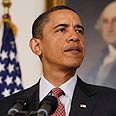
Obama: Expectations for Middle East peace too high
US president tells Time Magazine Israel, Palestinians unwilling to make the bold gestures. Mitchell's visit to region clouded by tough statements from both sides accusing the other of cynicism
President Barack Obama said his administration overestimated its ability to persuade the Israelis and Palestinians to resume meaningful peace talks.
Obama said both parties have been unwilling to make the bold gestures needed to move the process forward. If the US had anticipated that earlier, the American leader said he might not have raised his expectations so high.
"Both sides — the Israelis and the Palestinians — have found that the political environment, the nature of their coalitions or the divisions within their societies, were such that it was very hard for them to start engaging in a meaningful conversation. And I think that we overestimated our ability to persuade them to do so when their politics ran contrary to that," the American leader said in an interview with Time Magazine published Thursday.
"From (Palestinian President Mahmoud) Abbas' perspective, he's got Hamas looking over his shoulder and, I think, an environment generally within the Arab world that feels impatient with any process. And on the Israeli front — although the Israelis, I think, after a lot of time showed a willingness to make some modifications in their policies, they still found it very hard to move with any bold gestures," said Obama.
Addressing Iran, Obama said the US was "moving into a dual-track approach. Which is, if they don't accept the open hand, we've got to make sure they understand there are consequences for breaking international rules.
"It's going to be tough, but I think the relationship we've developed with Russia will be very helpful. The outreach we've done to our traditional NATO allies will be very helpful. The work that we've done with China — including the work we've done with China to enforce sanctions against North Korea — will help us in dealing more effectively with Iran," said the US president.
Obama said the US will continue to work toward a two-state solution in which Israel is secure and the Palestinians have sovereignty.
Israel and the Palestinians belittled each other's commitment to peace as US envoy George Mitchell began a fresh attempt on Thursday to break the deadlock and get them talking to each other again.
In an inauspicious start to his first shuttle diplomacy visit of 2010 after a dozen fruitless trips last year, Mitchell's arrival was clouded by tough statements from both sides accusing the other of cynicism.
'Palestinians have climbed up a tree'
Mitchell, as usual, said little and there was no immediate clue as to whether the public rhetoric might mask a more positive atmosphere in closed-door talks, first with Israelis in Jerusalem and then on Friday with the Palestinians in Ramallah.
Chief Palestinian negotiator Saeb Erakat said Israeli Prime Minister Benjamin Netanyahu had on Wednesday "imposed further conditions on negotiations and announced Israel's intention to continue its occupation" of the West Bank whatever happens.
"Benjamin Netanyahu has said 'No' to a settlement freeze, 'No' to sharing Jerusalem, 'No' to the 1967 borders, 'No' to the rights of Palestinian refugees. Now he wants to retain the Jordan Valley," Erekat said in a statement. He was referring to a comment by Netanyahu that Israel would retain military control around any future Palestinian state that included the West Bank.
"We had hoped to hear a clear commitment to negotiations without preconditions. What we got instead was Mr Netanyahu again trying to dictate their terms and preempt their outcome," Erakat said.
Addressing the foreign press late on Wednesday, Netanyahu attacked the Palestinian leadership for rejecting US calls to relaunch negotiations suspended for over a year.
"The Palestinians have climbed up a tree," he said. "And they like it up there. People bring ladders to them. We bring ladders to them. The higher the ladder, the higher they climb."
Diplomats say Mitchell seems to be seeking a face-saving way for Palestinian President Abbas to drop his insistence that Netanyahu must stop all settlement building in the West Bank and East Jerusalem before negotiations can be resumed.
Netanyahu's premiership at the head of a right-wing coalition got off to a rough start 10 months ago with the Obama administration.
When Mitchell first visited, the Israeli leader was refusing even to talk about establishing a Palestinian state. But last June he embraced the "two-state solution" and in November he ordered a partial 10-month halt to settlement building.
Western diplomats say Washington now seems increasingly frustrated with Abbas. One, speaking privately, said Abbas "as the weaker partner" was now the focus of US efforts to stir the peace process back to life.
There was an "implicit threat" of cuts in US aid to the West Bank if Abbas held out, he said.
Abbas hinted last week at a possible way out of the impasse, if Washington framed the talks in such a way as to set an "endgame", with the goal of a Palestinian state within a couple of years, or to define the parameters of the deal.
But Israel says that would prejudge the negotiations.
AP and Reuters contributed to the report










